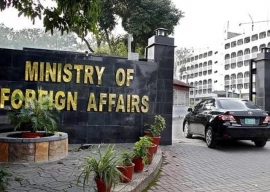
“This route, under the spirit of ongoing cross-LoC trade, was considered to be an important trade link between Punjab (Pakistan) and the neighbouring Indian-held state of Jammu and Kashmir before 1947,” the report pointed out, recalling that the people residing in Kashmir used to go to Lahore and Amritsar via Sialkot.
“Meanwhile, several bodies of traders and industrialists of Jammu have welcomed the statement of the IHK chief minister in which he remarked that he would recommend opening of Jammu-Sialkot road to the Indian government for travel and trade,” according to the report.
Jammu Chamber of Commerce and Industry President YV Sharma, while welcoming the statement of IHK chief minister, said that it was an old demand of traders and industrialists of Jammu. Sharma said this link had remained the traditional trade route prior to 1947 and opening of this trade link will give major boost to the economic activities on both sides. “Within few years, these destinations will emerge as international business hubs like Attari-Wagah border in Punjab,’’ he said.
Terming the move as part of confidence building measures between the two sides, Sharma said that it will go a long way in understanding political issues and making way for their resolution and healthy atmosphere.
Published in The Express Tribune, November 13th, 2012.
COMMENTS (2)
Comments are moderated and generally will be posted if they are on-topic and not abusive.
For more information, please see our Comments FAQ




































@sylmar khan: Thank you for elaborating your thinking in painful detail. I agree with you - hoping for a change in mentality is futile. Unfortunately you have not understood the thrust for developing this trade-route through the Jammu-Sialkot sector, which is to reduce operational costs for existing traders instead of having to route their transport through Wagah; the implications are lower costs for the end-user, who in most cases will be a Pakistani; for those who are happy to eat grass, this will not be of much consequence, but for normal citizens, it leaves the family more disposable income, which is usually welcome. It has nothing to do with Afghanistan or Turkestan or Rajasthan - we will manage without you, thank you very much.
this is joke. because indian government will always talk of trade. they will never want to resolve kashmir issue. Indians should know that as long kashmir resolution is binding. there will never be any peace let alone open new border for trade & travel.
Just like india does not want to resolve kashmir for kashmiris. pakistan also does not want to resolve sialkot jammu route for trade travel.
that is why india is having hard time. india wants to trade with turkestan states and afghanistan thru pakistan. pakistan does not let india trade. that is why they use afghan iran route for trade.
pakistan should forget about indian adventure. they will never want to resolve kashmir. so let them have peace to themselves.
india used to have 2 billion trade with pakistan. now afghanistan has 2 billion trades with pakistan while india pakistan trade went to six billion. who is losing the pakistan afghanistan turkestan market. it is india.
we should not give india anymore benefits. india is enemy let her taste our venum. for bangladesh & kashmir india has made the biggest enemy. there is no security issue.
india does not know that by occupation it is losing big market for suppression.